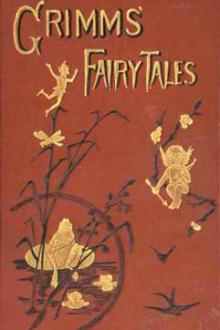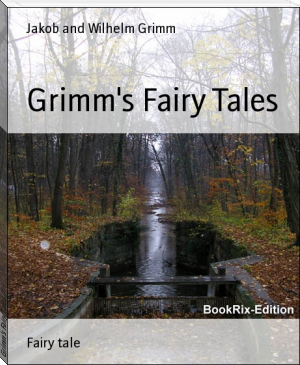Household Tales, Wilhelm Grimm [good books to read for women TXT] 📗

- Author: Wilhelm Grimm
- Performer: -
Book online «Household Tales, Wilhelm Grimm [good books to read for women TXT] 📗». Author Wilhelm Grimm
So the Queen thought the whole night of all the names that she had ever heard, and she sent a messenger over the country to inquire, far and wide, for any other names that there might be. When the manikin came the next day, she began with Caspar, Melchior, Balthazar, and said all the names she knew, one after another; but to every one the little man said, “That is not my name.” On the second day she had inquiries made in the neighborhood as to the names of the people there, and she repeated to the manikin the most uncommon and curious. “Perhaps your name is Shortribs, or Sheepshanks, or Laceleg?” but he always answered, “That is not my name.”
On the third day the messenger came back again, and said, “I have not been able to find a single new name, but as I came to a high mountain at the end of the forest, where the fox and the hare bid each other good night, there I saw a little house, and before the house a fire was burning, and round about the fire quite a ridiculous little man was jumping: he hopped upon one leg, and shouted–
“To-day I bake, tomorrow brew,
The next I’ll have the young Queen’s child.
Ha! glad am I that no one knew
That Rumpelstiltskin I am styled.”
You may think how glad the Queen was when she heard the name! And when soon afterwards the little man came in, and asked, “Now, Mistress Queen, what is my name?” at first she said, “Is your name Conrad?” ” No.” “Is your name Harry?” “No.”
“Perhaps your name is Rumpelstiltskin?”
“The devil has told you that! the devil has told you that!” cried the little man, and in his anger he plunged his right foot so deep into the earth that his whole leg went in; and then in rage he pulled at his left leg so hard with both hands that he tore himself in two.
56 Sweetheart Roland
There was once on a time a woman who was a real witch and had two daughters, one ugly and wicked, and this one she loved because she was her own daughter, and one beautiful and good, and this one she hated, because she was her step-daughter. The step-daughter once had a pretty apron, which the other fancied so much that she became envious, and told her mother that she must and would have that apron. “Be quiet, my child,”
said the old woman, “and thou shalt have it. Thy step-sister has long deserved death, to-night when she is asleep I will come and cut her head off. Only be careful that thou art at the far-side of the bed, and push her well to the front.” It would have been all over with the poor girl if she had not just then been standing in a corner, and heard everything. All day long she dared not go out of doors, and when bed-time had come, the witch’s daughter got into bed first, so as to lie at the far side, but when she was asleep, the other pushed her gently to the front, and took for herself the place at the back, close by the wall. In the night, the old woman came creeping in, she held an axe in her right hand, and felt with her left to see if anyone was lying at the outside, and then she grasped the axe with both hands, and cut her own child’s head off.
When she had gone away, the girl got up and went to her sweetheart, who was called Roland, and knocked at his door. When he came out, she said to him, “Hear me, dearest Roland, we must fly in all haste; my stepmother wanted to kill me, but has struck her own child. When daylight comes, and she sees what she has done, we shall be lost.” “But,” said Roland, “I counsel thee first to take away her magic wand, or we cannot escape if she pursues us.” The maiden fetched the magic wand, and she took the dead girl’s head and dropped three drops of blood on the ground, one in front of the bed, one in the kitchen, and one on the stairs. Then she hurried away with her lover. When the old witch got up next morning, she called her daughter, and wanted to give her the apron, but she did not come. Then the witch cried, “Where art thou?” “Here, on the stairs, I am sweeping,” answered the first drop of blood. The old woman went out, but saw no one on the stairs, and cried again, “Where art thou?” “Here in the kitchen, I am warming myself,” cried the second drop of blood. She went into the kitchen, but found no one. Then she cried again, “Where art thou?” “Ah, here in the bed, I am sleeping.” cried the third drop of blood. She went into the room to the bed. What did she see there? Her own child, whose head she had cut off, bathed in her blood. The witch fell into a passion, sprang to the window, and as she could look forth quite far into the world, she perceived her step-daughter hurrying away with her sweetheart Roland. “That shall not serve you,” cried she, “even if you have got a long way off, you shall still not escape me.” She put on her many league boots, in which went an hour’s walk at every step, and it was not long before she overtook them. The girl, however, when she saw the old woman striding towards her, changed, with her magic wand, her sweetheart Roland into a lake, and herself into a duck swimming in the middle of it. The witch placed herself on the shore, threw bread-crumbs in, and gave herself every possible trouble to entice the duck; but the duck did not let herself be enticed, and the old woman had to go home at night as she had come. On this the girl and her sweetheart Roland resumed their natural shapes again, and they walked on the whole night until daybreak. Then the maiden changed herself into a beautiful flower which stood in the midst of a briar hedge, and her sweetheart Roland into a fiddler. It was not long before the witch came striding up towards them, and said to the musician, “Dear musician, may I pluck that beautiful flower for myself?” “Oh, yes,” he replied, “I will play to you while you do it.” As she was hastily creeping into the hedge and was just going to pluck the flower, for she well knew who the flower was, he began to play, and whether she would or not, she was forced to dance, for it was a magical dance. The quicker he played, the more violent springs was she forced to make, and the thorns tore her clothes from her body, and pricked her and wounded her till she bled, and as he did not stop, she had to dance till she lay dead on the ground.
When they were delivered, Roland said, “Now I will go to my father and arrange for the wedding.” “Then in the meantime I will stay here and wait for thee,” said the girl, “and that no one may recognize me, I will change myself into a red stone land-mark.” Then Roland went away, and the girl stood like a red land-mark in the field and waited for her beloved. But when Roland got home, he fell into the snares of another, who prevailed on him so far that he forgot the maiden. The poor girl remained there a long time, but at length, as he did not return at all, she was sad, and changed herself into a flower, and thought, “Some one will surely come this way, and trample me down.”
It befell, however, that a shepherd kept his sheep in the field, and saw the flower, and as it was so pretty, plucked it, took it with him, and laid it away in his chest. From that time forth, strange things happened in the shepherd’s house. When he arose in the morning, all the work was already done, the room was swept, the table and benches cleaned, the fire on the hearth was lighted, and the water was fetched, and at noon, when he came home, the table was laid, and a good dinner served. He could not conceive how this came to pass, for he never saw a human being in his house, and no one could have concealed himself in it. He was certainly pleased with this good attendance, but still at last he was so afraid that he went to a wise woman and asked for her advice. The wise woman said, “There is some enchantment behind it, listen very early some morning if anything is moving in the room, and if thou seest anything, let it be what it may, throw a white cloth over it, and then the magic will be stopped.”
The shepherd did as she bade him, and next morning just as day dawned, he saw the chest open, and the flower come out. Swiftly he sprang towards it, and threw a white cloth over it. Instantly the transformation came to an end, and a beautiful girl stood before him, who owned to him that she had been the flower, and that up to this time she had attended to his housekeeping. She told him her story, and as she pleased him he asked her if she would marry him, but she answered, “No,” for she wanted to remain faithful to her sweetheart Roland, although he had deserted her, but she promised not to go away, but to keep house for the shepherd for the future.
And now the time drew near when Roland’s wedding was to be celebrated, and then, according to an old custom in the country, it was announced that all the girls were to be present at it, and sing in honour of the bridal pair. When the faithful maiden heard of this, she grew so sad that she thought her heart would break, and she would not go thither, but the other girls came and took her. When it came to her turn to sing, she stepped back, until at last she was the only one left, and then she could not refuse. But when she began her song, and it reached Roland’s ears, he sprang up and cried, “I know the voice, that is the true bride, I will have no other!” Everything he had forgotten, and which had vanished from his mind, had suddenly come home again to his heart. Then the faithful maiden held her wedding with her sweetheart Roland, and grief came to an end and joy began.
57 The Golden Bird
In the olden time there was a king, who had behind his palace a beautiful pleasure-garden in which there was a tree that bore golden apples. When the apples were getting ripe they were counted, but on the very next morning one was missing. This was told to the King, and he ordered that a watch should be kept every night beneath the tree.
The King had three sons, the eldest of whom he sent, as soon as night came on, into the garden; but when midnight came he could not keep himself from sleeping, and next morning again an apple was gone.
The following night the second son had to keep watch, it fared no better with him; as soon as twelve o’clock had struck he fell asleep, and





Comments (0)